|
In This Issue:
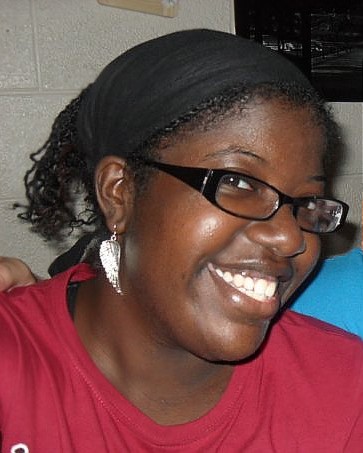
This is the second article in a series
about the lives of English majors and the different places they come
from.
The Way the
Wind Blows
By Fannetta Jones
I have been a Chicagoan all my life. I’ve lived in the same
neighborhood, on the same street, for as long as I can remember. In
a big city like Chicago, there are plenty of opportunities to
explore literature and over various avenues of artistic expression.
With this in mind, there is no question as to why I was interested
in the English major. Having been surrounded by such a large amount
of creativity all my life, I could not help but want to go into this
field myself. It just so happened that English and writing were two
areas of interest that really appealed to me. Something about the
written word that seemed to fit me best. After making the decision
to pursue English in my sophomore year of high school, it was just a
matter of time before I was able to decide which college I would
attend to further my exploration of the English language. Being in
Chicago, I had a wide variety of places to attend. From University
of Chicago, to Columbia College, and even University of Illinois,
there were so many schools that seemed to fit what I was looking for
in a school. It is a wonder that a massive place like the Windy City
somehow blew me almost four hours south down to the town of
Monmouth.
Enrolling in the English major at Monmouth College has done a lot
for me that I think I may not have gotten had I stayed up near
Chicago. For example, at Monmouth College I’ve learned a lot about
Carl Sandburg, a literary figure I’d only heard of in passing while
going through school in Chicago. I have been able to do a lot more
close reading of pieces that I may have only glanced over in high
school. Essentially, Monmouth’s English department has presented
literature and writing to me in a way that I could understand. At a
big university, it is easy to get lost in the crowd and be expected
to just “know” what is going on. However, at Monmouth, the
professors work towards enhancing your interpretations and overall
understanding of literary pieces. This has truly helped me towards
becoming a better English major and writer as a whole.
Now, it goes without saying that coming to Monmouth was a bit of a
culture shock. I’m accustomed to big buildings and loud noise at all
hours of the night. Here at Monmouth, our only neighbors are corn
stalks, and that definitely took some getting used to. I also had to
get used to not being within 15 minutes of anything I could possibly
need at a given time. I suppose city life will do that to you. But
at Monmouth, I’ve been able to do a lot of things I can’t do in the
city. I enjoy sitting outside and looking at the stars that I
normally can’t see in the city due to all the lights. I enjoy being
able to go to a store in town and have people actually know my name.
I guess Monmouth, being such a small town, has really taught me to
appreciate the “little things.”

Reunion Not to Miss: English and Latin
By Alex
Nall
Over the summer I was presented the opportunity to take Latin as a
foreign language over my alternative, Spanish (which I had drudged
through in high school for two years). I was excited by the
challenge and was told that Latin was the core center of many other
languages. Perhaps if I studied Latin I would have a better
understanding of English. Since I am an English major I decided to
take the 8 am Latin 101 class taught by Professor Tom Sienkewicz. As
the class progressed I had a few questions come to mind: What could
learning Latin offer us in the 21st century, how did our
magister (teacher) get his start and how could Latin help English
majors and minors.
I
conducted an interview with Magister Sienkewicz and here is what he
told me about his personal history and his opinions about the
relationship between Latin and English.
He told
me a quick history of Latin being taught in high schools up until
the 1960s when Latin had been required to get into college. Magister
Sienkewicz has his experience with the language since he took it for
four years in high school and three years of Greek as well. He also
said that the removal of the requirement of Latin in high schools
has blossomed a “shortage of Latin teachers” throughout the nation.
When I
asked how Latin can be used to help English majors he told me that
in Latin there is a strong focus on grammar. He said, “Latin helps
students realize where the origin of some words come from and how
our modern language is derived from ancient Roman words. For
example, the word
janitor
comes from
ianitor,
a Roman guardian of a wealthy family’s household.” He told me the
importance between the realizing the differences between Roman
society and the modern world we live in today. He also emphasized
that “ancient cultures offer us different perspectives on the world,
perspectives which enable us to better understand our own culture
and our own times.”
Magister
Sienkewicz and Kenneth Kitchell of the University of Massachusetts
Amherst wrote the textbook designed for the class and, to make the
lessons easier to comprehend, they have included a narrative story
featuring two families (one poor, one rich), set in Caesar’s Roman
empire and a monkey named Socrates. When I told him that English
majors would find this an interesting approach to teaching a foreign
language he told me that he and his co-writer were not the first
professors to approach this method. He said that the main objective
of the class is not to be able to write Latin but to be able to
decipher it and understand its importance. English majors can
appreciate the idea of introducing a storyline and characters into
other subjects since it makes the class not only more interesting
but more comprehensible as well.
I
recommend students, and English majors especially, to take the Latin
class in order to grasp a better understanding of where the language
they are studying came from and how it is used today. The Latin
class offers fun assignments, rewards for vocabulary bees but also
an opportunity to go to Rome and the promise that “you are
guaranteed a job as a Latin teacher!”
A Moment with Marlo
By Fannetta Jones

One
aspect of the English department that hasn't quite been the same
this year is the absence of our beloved professor, Marlo Belschner.
Professor Belshner was given the amazing opportunity to go abroad
and further her studies in English and Shakespeare (her love, haha).
I was given the lucky opportunity to converse with Professor
Belschner about her travels and here is a bit of how that
conversation transpired:
How are you enjoying sabbatical?
It is amazing. To have all of this time to read and catch up
on what is happening in Shakespeare studies is amazing. To be
able to read for pleasure every day, too--for hours, most days--is
the most amazing gift. My sabbatical is more incredible than I
even imagined. It has given me the gift of time, which doesn't
happen very often.
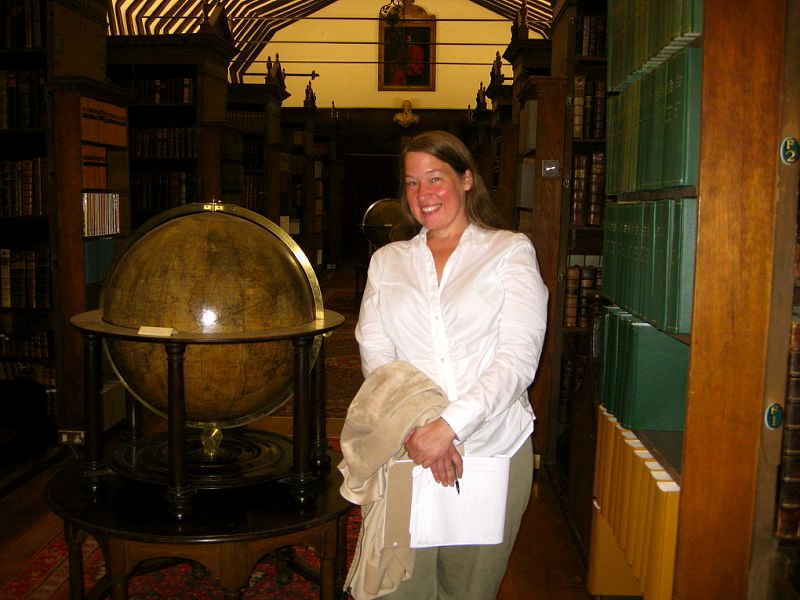
How did you recieve the grant that allowed you to go abroad?
I applied for the NEH summer seminar by writing a brief application
letter and sending in my CV and letters of recommendation. The
history of the early printing press is a new interest that I hope
will complement the research and teaching interests that I already
have.
Where did you go and what did you do there?
We began in Antwerp, Belgium, studying with Professor Guido Latre at
the Plantin Moretus museum. Each library that we visited
created a special display of manuscripts and early printed books at
our request, and this was a highlight of the trip. My favorite part
of Belgium was paging through a gorgeous 1405 illustrated Bible
manuscript. It was also a great privilege to learn from
Professor Latre, a wonderful lecturer whose knowledge is vast.
We then moved to London and the British Library. My plan was to
examine three copies of Elizabeth Cary's closet drama, The Tragedy
of Mariam (1613) at the BL but they were in use so I didn't get to
look at them until I returned later in the summer. This was my
first opportunity to work in the new British Library, though, and I
was very pleased. The library has become more accessible to
non-academics, which makes it more lively but this also raises
serious concerns about wear and tear on the texts.
Nevertheless, the book exhibit was amazing: we examined personal
copies of religious texts owned by Henry VIII, Anne Boleyn, and
Elizabeth I. Awesome. It was a serious geekfest!
Finally, we travelled to Oxford for four weeks. This was
outstanding! We worked at the Duke Humphrey's library, which
is gorgeous. I examined a series of letters by Elizabeth Cary's
children as well as three more printed copies of The Tragedy of
Mariam (1613). We had fascinating seminar meetings about our
readings and research. There was also a lot of time for fun: I had
day trips to Bath, Birmingham, Stratford, and London, and I watched
a ton of plays including two unbelievable versions of The Winter's
Tale. Of most interest to you? I saw Jude Law in Hamlet,
Ethan Hawke in The Winter's Tale, and...drum roll, please...Patrick
Stewart and Ian McKellan in Waiting for Godot. I saw 10 - 12 plays
in all, I think, including a truly horrible version of 'Tis Pity
She's a Whore.
After the five-week seminar, I went to London for two weeks, visited
St. Ives in Cornwall for a week with a friend, and then returned to
London for another week before returning back to Minnesota in
August. It was an exciting trip!
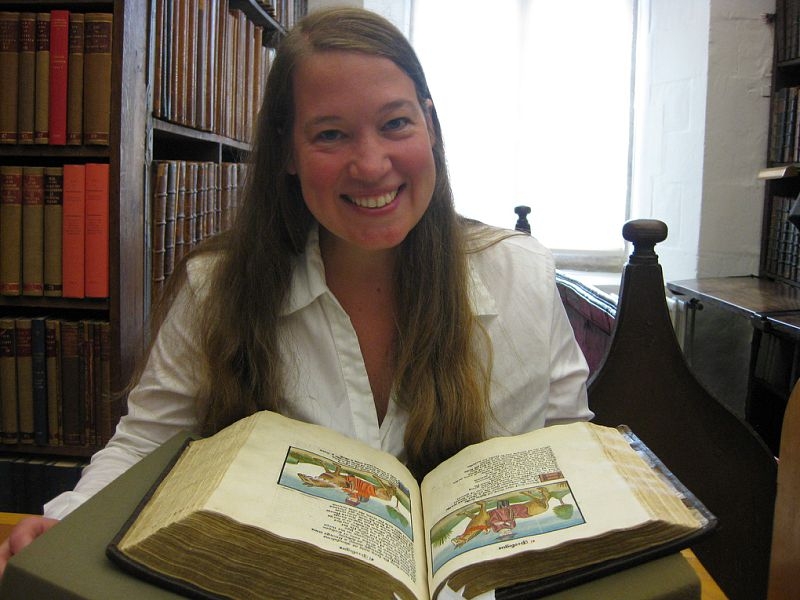
How will what you gathered on the trip enhance your future
teaching?
I learned a lot about the role of early printing press during the
Reformation for both Protestants and Catholics. This seminar
is relevant to all of my early modern literature courses from the
early British survey to Shakespeare. There are also some
fascinating issues of theory including discussions of how readers of
various skills levels both read and wrote in the period. If a text
is well-illustrated, how would someone who is illiterate "read" it?
Could it be used subversively as a Catholic text when it was
originally a Protestant one--or at least was disguised as a
Protestant text?
Do you miss being in the classroom?
More than I thought I would! The excitement of the beginning
of the school year can be addictive, and I miss hearing students
discover exciting new ideas and texts. I don't miss grading, of
course, and I don't miss students' anxieties about work load and
deadlines, though.
Are you sad/disappointed that you will not be teaching the
Shakespeare course this year?
Of course! There are two sad parts of my sabbatical: I miss
Professor Hale and I'm sorry that I won't be teaching the old
ruff-wearing bastard this year! I'm pretty excited to share some of
the new ideas that I have about his work, though. I may have
an opportunity to enhance my use of performance studies in the
Shakespeare course toward the end of my sabbatical, and that would
be very exciting for me and for students.
Do you have any advice for English majors in regards to going
abroad?
Go. It is easier and cheaper than you think, and it deepens
your life more than you can imagine. The world is a beautiful place. When in your life will you have a chance to go abroad for five-six
months? Never, for most people. I've never known a student to regret
it although I've met many who wished they could have stayed longer.
Talk to Crazy Laura Dumont if you are unsure if it will be a good
time. :)
What is one final thought you would like to leave the majors
with?
I miss you--especially the seniors! Don't forget to read! It
is the main thing that our graduates tell us: I wish I would have
been more disciplined about keeping up on the reading, especially in
the surveys. And if you are looking for pleasure reading, pick up
McCormac's The Road. Awesome!
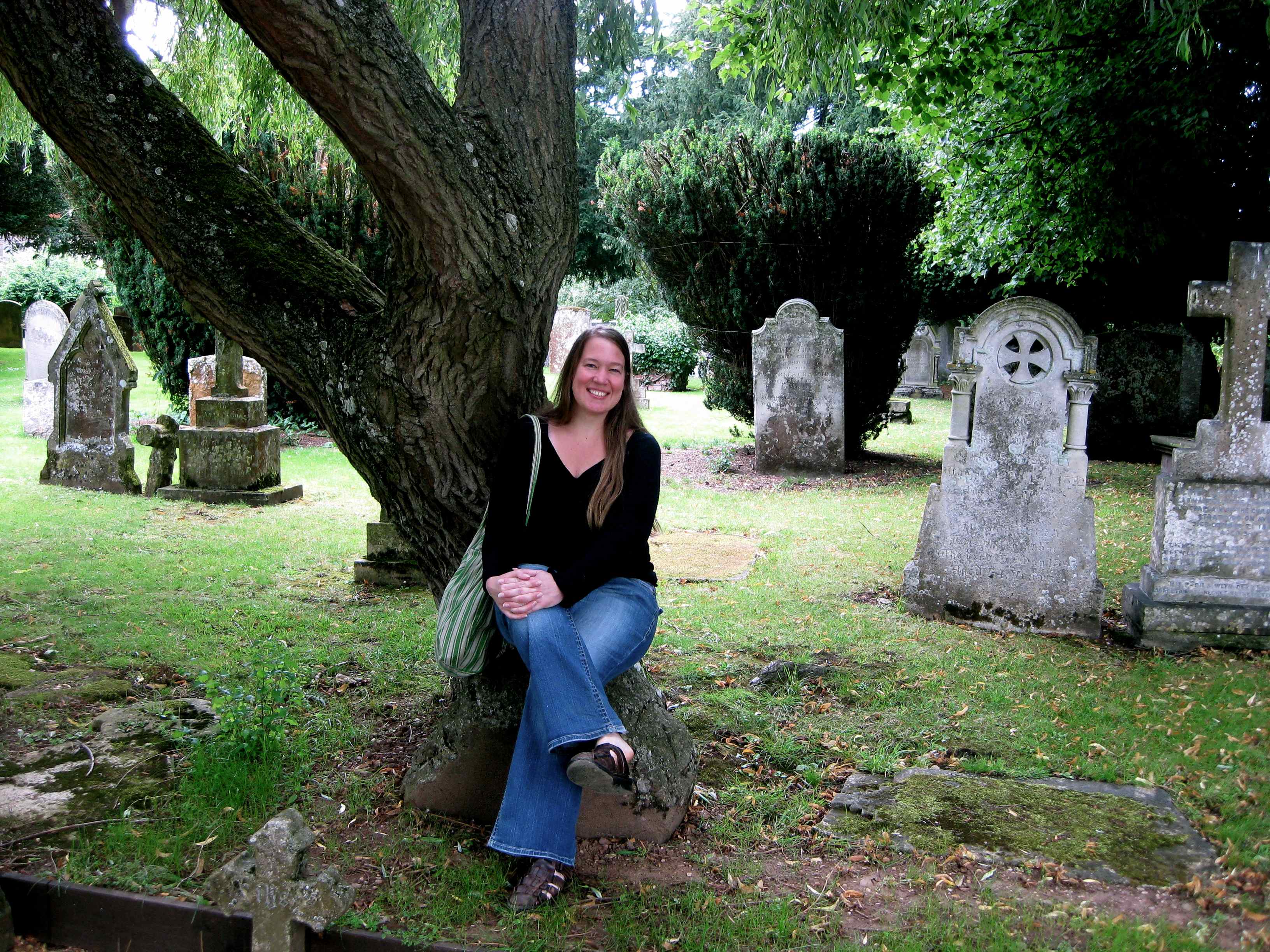
Survey Says!!!!

What
has been your favorite piece of literature in college so far?
"We are Seven" by
Wordsworth!
-Kaitlyn Kross
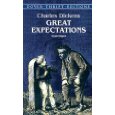
I know
it's a bit of a cliche to pick out Great Expectations, but it
really is a great novel and deserves the credit.
-Daniel Weber
Ben Jonson "Song to
Celia"
-Daniel Pitts
"The
Canterbury Tales" is definitely my favorite and reading it with Willhardt wasn't
half bad either.
-Katie Argentine
"The Minister's Black
Veil" by Nathaniel Hawthorne is probably my favorite piece of literature read in
college so far.
-Tiffany Lefler

Beowulf
- Jonathan Snowdon
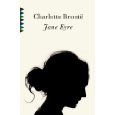 I really love
Adrienne Rich's poem "Aunt Jennifer's Tigers." My favorite novel is probably
Jane Eyre. I really love
Adrienne Rich's poem "Aunt Jennifer's Tigers." My favorite novel is probably
Jane Eyre.
- Maddie Ethington
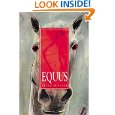
As far as
literature in college I would have to say that my favorites have been anything
Poe or Shakespeare. I also enjoyed reading Equus.
-Rissa Inman

1-Macbeth
2-The Catcher
in the Rye
3-The Great
Gatsby
4-Sonnet 128
(Shakespeare)
-Carlos
Mora Sandi
Hmmm... I would probably
say Equus (drama) with Watson. What a crazy story!
-Kayt
Griffith
"A Meeting in the Night" from
English 200 with Mark, we learned to love that poem dearly...
- Ivy Becker
My favorite poem that I have read
since I have been in college is "Vulture" by Robinson Jeffers. "What an
enskyment"!
-Suzanne Barber
There have been so
many brilliant pieces of literature, but one of the most memorable ones was the
short story, "After the Plague," about swine flu knocking off 99% of the
population. No worries, guys. No worries.
- Noelle Templeton
Shoot, there have been so many
piece that I've really enjoyed. But, I would have to say "Goblin Market" by:
Christina Rossetti and "The Fornicator" by: Robert Burns. I think I'm a little
twisted like that.
-Fannetta Jones
My favorite book this semester so
far has been something outside of class called Eating the Dinosaur by
Chuck Klosterman. It is a collection of essays that relate pop culture to
historical events. One of my favorites is how Klosterman relates the production
of Nirvana's album "In Utero" to the the Branch Davidson disaster in Waco,
Texas. Very intelligent, extremely funny and recommended for students who want
to learn how to write argumentative essays.
-Alex Nall
|








 I really love
Adrienne Rich's poem "Aunt Jennifer's Tigers." My favorite novel is probably
Jane Eyre.
I really love
Adrienne Rich's poem "Aunt Jennifer's Tigers." My favorite novel is probably
Jane Eyre.
